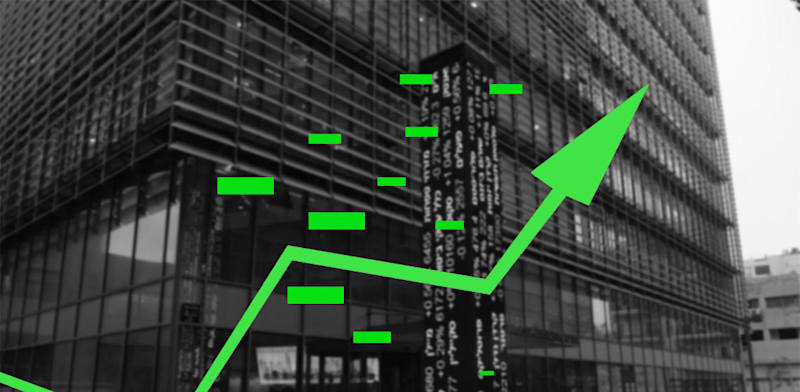Foreign investors have been boosting the Tel Aviv Stock Exchange (TASE) performance recently, and perhaps this is part of the reason why the TASE declined much less than markets abroad over the past week. Overseas investors are not enthusiastic about Israel’s domestic political mess (moves to dismiss the head of the Shin Bet and the Attorney General). Nevertheless, foreign investors are flocking here because of US President Donald Trump’s tariff plan, and the strong results recently published by Israeli companies traded on the TASE, mainly the banks.
According to data from the TASE research department obtained exclusively by “Globes,” foreign investors have taken the TASE by storm since the beginning of April, purchasing shares worth over NIS 900 million, including NIS 800 million between Tuesday and Thursday last week, at the same time as Trump’s dramatic tariff announcement. These large purchases came after foreign investors bought shares worth almost NIS 4 billion in March. Since the beginning of 2025, foreign investors have purchased shares worth NIS 5.2 billion, and the TASE notes that foreign investments are now at a 5-year high.
To understand how unusual these figures are, it is enough to look at January-February 2025, in which foreign investors purchased a net of about half a billion shekels. Even from a broader perspective, the numbers are now very unusual. In 2024 as a whole, foreign investors on the TASE sold shares worth NIS 1.3 billion, in 2023 they sold a net NIS 1.7 billion.
TASE research found that investors have concentrated mainly on the large shares in the Tel Aviv 35 index. According to the data, foreign investors purchased bank shares worth NIS 2.6 billion, and a further NIS 1.8 billion on the stocks of defense industry giant Elbit Systems and software company NICE Systems.
Foreigners investors have returned to a net positive balance for the first time since the outbreak of the war
Following recent purchases on the TASE, foreign investors now have a positive NIS 50 million balance of net purchases for the first time since the outbreak of the war in October 2023. After the start of the war, foreign investors ‘dumped’ Israeli stock with a cumulative volume of over NIS 9 billion. Foreign investors, who kept their shares during the political unrest over the judicial reform in 2023, sold NIS 3.9 billion of stock in the first three months of the war, and a further NIS 5.3 billion in stock in the first half of 2024. In the third quarter of 2024, they began returning to the TASE, as reported by “Globes” last year.
RELATED ARTICLES

TASE opens sharply higher after Trump U-turn on tariffs
TASE data and information services manager Hadar Romano tells “Globes” that the entry of foreign investors began with the publication of the banks’ strong financial reports. She says, “Unlike during the war, in which (Israeli) institutional investors were the only player in the market, in recent months foreign investors have also become a significant player, and even more so than the institutional investors.
“You can see that foreign investors are not affected by domestic events taking place in Israel. They are not affected by the dismissal of Shin Bet chief Ronen Bar, just as they did not sell in 2023 during the judicial reform. On the other hand, they are affected by the war. From the moment fighting on the northern front ended, we have see a return of foreign investors to the local market.
“Furthermore, due to the banks’ strong reports, they have invested a high amount of almost NIS 5 billion, since the beginning of March until today. Despite the war and the political crisis, foreigners see Israel as a strong and growing economy, an opportunity, for them. We are really a safe haven right now,” she adds, referring to the volatility in the markets following Trump’s tariff plan and its freeze.
Lack of activity by foreigner investors can only be seen in the bond market. “Since the beginning of the war, you can count on one hand the days in which they have purchased government bonds. There you can see that they are not buying but rather exiting, every day.”
The Israeli public is bothered more by the firing of the Shin Bet chief than by Trump
Through mutual funds and exchange-traded funds (ETFs), the Israeli public has sold shares worth NIS 300 million since the beginning of April, including NIS 215 million since the start of this week. In total, since the start of 2025, the public has bought shares worth NIS 4.6 billion (the vast majority of them in January-February), following purchases worth NIS 3 billion in 2024.
Romano notes that for Israelis, the more significant factor is domestic instability in Israel and not Trump. “Selling by the Israeli public do not necessarily stem from Trump’s tariff policy, but rather from the firing of the Shin Bet chief and the fear of judicial reform. At the beginning of March, the public was still buying shares, but from March 23rd, we see an outflow of funds from the general public, through mutual funds and exchange-traded funds, and this has continued in recent days with the fear of Trump’s tariff policy.”
According to Romano, “The sale now because of Trump is no different from previous crises. “You can’t say that there is panic among the Israeli public compared with abroad, or compared with Covid, when there really was panic. The Israeli public is now demonstrating maturity.”
Institutional investors are realizing profits but bought during the falls caused by Trump’s tariffs
The institutional investors, the managers of public savings (provident funds, pensions), were the factor that absorbed the holdings of foreign investors who sold after the outbreak of the war. Between October 2023 and March 2024, they purchased shares worth NIS 9.5 billion. In the following six months, they did not make any significant purchases, and then, from October 2024 and in parallel with the sharp 30% jump in the Israeli stock market, after the pager operation against Hezbollah, and the assassinations of Hamas leader Yahya Sinwar and Hezbollah secretary general Hassan Nasrallah, the institutional investors began selling and realizing profits. Since then, they have sold shares worth 60% of the stocks they previously bought. Thus, their balance of purchases since the beginning of the war to the present amounts to over NIS 3.6 billion.
How did the Israeli institutions investors respond to Trump’s tariffs, the resumption of the judicial reform and the firing of the Shin Bet chief? Of the sales just mentioned, since the beginning of 2025 the institutions have sold ETFs worth NIS 2.6 billion, with NIS 2.2 billion sold in January, NIS 1 billion purchased in February and ETFs worth NIS 1.2 billion sold, and at the beginning of April they sold NIS 500 million. Last week the trend reversed again and following the sharp declines in the markets they bought ETFs worth NIS 370 million.
Published by Globes, Israel business news – en.globes.co.il – on April 10, 2025.
© Copyright of Globes Publisher Itonut (1983) Ltd., 2025.





